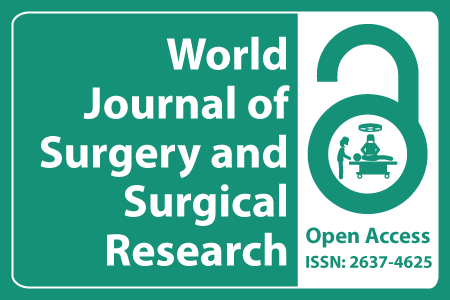
Journal Basic Info
- Impact Factor: 1.989**
- H-Index: 6
- ISSN: 2637-4625
- DOI: 10.25107/2637-4625
Major Scope
- Minimal Invasive Surgery
- Bariatric Surgery
- Emergency Surgery
- Dental Surgery
- Reconstructive Surgery
- Podiatric Surgery
- Otolaryngology & ENT Surgery
- Hepatology
Abstract
Citation: World J Surg Surg Res. 2019;2(1):1128.DOI: 10.25107/2637-4625.1128
Study on the Efficacy of Daikenchuto on Bowel Motility after Laparoscopic Resection of Colorectal Cancer
Yutaka Kojima, Kazuhiro Sakamoto, Yuichi Tomiki, Kunihiko Nagakari, Atsushi Okuzawa, Makoto Takahashi, Hirohiko Kamiyama, Shun Ishiyama, Kiichi Sugimoto, Shinya Munakata, Masaya Kawai, Kosuke Mizukoshi and Yu Okazawa
Department of Coloproctological Surgery, Juntendo University Faculty of Medicine, Japan
*Correspondance to: Yutaka Kojima
PDF Full Text Research Article | Open Access
Abstract:
Introduction: Daikenchuto is considered to have actions that promote gastrointestinal motility and inhibit inflammation. We examined the efficacy of Daikenchuto on bowel motility after laparoscopic resection of colorectal cancer.
Materials and Methods: The subjects were 64 patients (33 Daikenchuto, 31 non Daikenchuto group) who underwent laparoscopic resection of colorectal cancer at our department. From Day 2, Daikenchuto was administered to the Daikenchuto group at a dose of 15 g. On days 1 and 5, plain X-ray and blood sampling were performed, in addition to the application of a questionnaire survey for bowel function. The plain X-ray images were examined using Image J image analysis software to measure the gas volume in the intestine and determine the Gas Volume Score (GVS). We evaluated bowel function using the Japanese version of Gastrointestinal Symptom Rating Scale (GSRS) as a QOL score. We also examined the duration of the operation, intraoperative blood loss and initial emission of gas after the surgery, initial defecation, duration of postoperative hospitalization, inflammatory reaction, and hepatic function.
Results: There were no significant differences between the Daikenchuto and the non-administration groups regarding background factors, QOL score and GVS. There were no significant differences between the two groups for other factors.
Discussion: No significant difference was observed between the two groups regarding laparoscopic resection of colorectal cancer in this study. The results of this study may be due to the fact that the minimally invasive laparoscopic surgery results in a favorable postoperative course, with less bowel paralysis, compared with abdominal open surgery.
Keywords:
Kampo medicine; Laparoscopic colorectal surgery; Daikenchuto
Cite the Article:
Kojima Y, Sakamoto K, Tomiki Y, Nagakari K, Okuzawa A, Takahashi M, et al. Study on the Efficacy of Daikenchuto on Bowel Motility after Laparoscopic Resection of Colorectal Cancer. World J Surg Surgical Res. 2019; 2: 1128.













